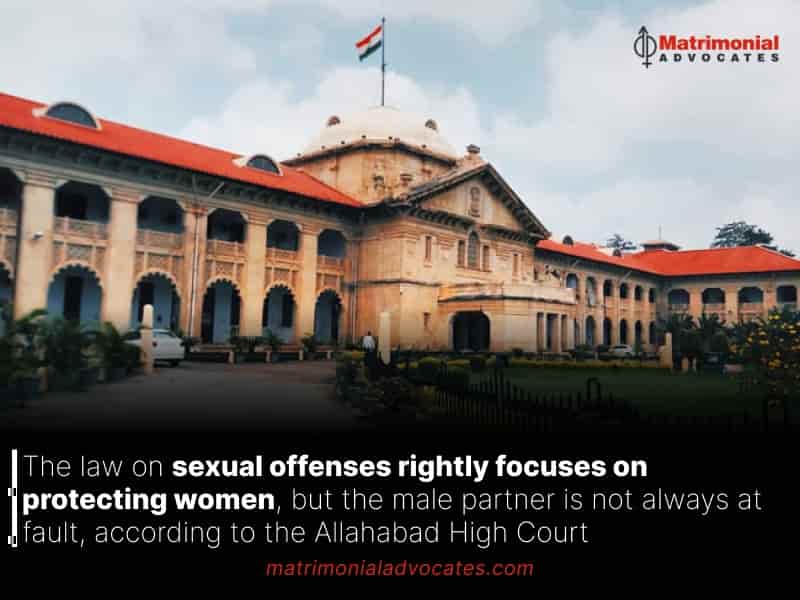
The burden of proof is upon both of the complainant and accused, the Court said while upholding the acquittal of a man accused of rape on false promise of marriage.
The Allahabad High Court recently noted that while the law on sexual offenses is rightly focused on protecting women, it does not mean that the male partner is always at fault. In a case involving rape based on a false promise of marriage, a Division Bench of Justices Rahul Chaturvedi and Nand Prabha Shukla emphasized that the burden of proof rests with both the complainant and the accused. These comments were made while affirming the acquittal of the accused in the rape case.
“No doubt, chapter XVI “Sexual Offences”, is a womensentic (sic) enactment to protect the dignity and honour of a lady and girl and rightly so, but while assessing the circumstances, it is not the only and every time the male partner is at wrong, the burden is upon both of them,” the Court observed.
The Court was addressing the complainant’s appeal challenging the acquittal of the accused in a rape case where he had also faced charges under the Scheduled Caste and Scheduled Tribe (Prevention of Atrocities) Act, 1989.
In 2019, the victim lodged a police complaint alleging that the accused had engaged in a sexual relationship with her on the promise of marriage, which he later reneged on. She further alleged that he had made disparaging remarks about her caste.
Formal charges were laid against the accused in 2020. Earlier this year, the trial court acquitted him of the rape charge but found him guilty under Section 323 (voluntarily causing hurt) of the Indian Penal Code (IPC).
The victim subsequently appealed against the trial court’s decision.
In response, the accused informed the Court that their relationship had been consensual and that he had chosen not to marry her upon discovering that her actual caste did not match the ‘Yadav’ caste she had initially claimed.
After reviewing the arguments and evidence presented, the Court observed that the complainant had been married in 2010 but had begun living separately from her husband after two years. The Court also noted that the complainant had denied her previous marriage and professed ignorance regarding her name in the family register submitted to the trial court.
“On this score, the learned trial court has rightly given a finding that under circumstances, it is highly unlikely that the accused-respondent have trapped her in the false pretext of marriage. Secondly, assuming for the sake of argument, that some promise was extended to her but after the emergence of this new fact, that victim is already married to xxx and that marriage still subsist, then any amount of promise to marry would automatically get evaporated,” it said.
Regarding the application of the SC/ST Act in this case, the Court emphasized that the caste of the parties is significant in determining the enduring nature of any relationship within society. In this regard, the Court observed that the complainant failed to provide sufficient evidence to support her claim about her caste.
“Therefore, it can be easily inferred that a lady who is already married and without dissolution of her earlier marriage and concealing her caste has maintained the physical relationship for good 5 years without any objection and hesitation and both of them have visited numbers of hotel, lodges at Allahabad and Lucknow and enjoyed the company of each other. It is difficult to adjudicate who is befooling whom?,” it said.
The Court thus concluded that the trial court had rightly acquitted the accused.
“It is unswallowable proposition that a weaker sex is being used by the male partner for five good years and she keep on permitting him on so called false pretext of marriage. Both of them are major and they understand the gravity of the situation and the far reaching repercussion of pre-marital sex and still they maintained this relationship at different places, different cities, which clearly indicates that this acquisitions that she was subjected to sexual harassment and rape cannot be accepted,” it said





